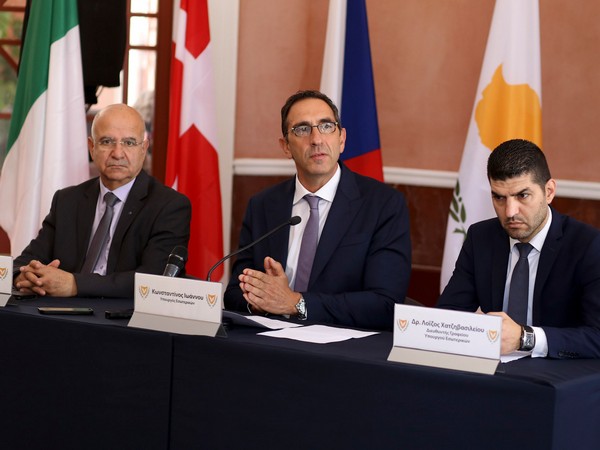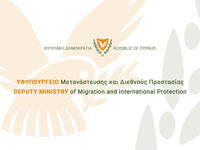Press Releases

17-05-2024 13:35
Statement by the Minister of the Interior of the Republic of Cyprus on the outcome of the Ministerial Summit “Migration and Syria Dynamics”
Dear media representatives,
Thank you for your presence and your interest in today’s Summit, where we had the pleasure of welcoming Ministers and high-ranking officials from Greece, the Czech Republic, Austria, Poland, Italy, Denmark and Malta. The Summit is an initiative of the Republic of Cyprus and is the result of bilateral contacts that I have been conducting over the last few months with my counterparts, Ministers responsible for migration and asylum issues.
The countries invited and participating today are our partners who share our concerns about the challenges posed by the intense migratory pressure on the member states of the European Union (EU). At the same time, we share the view that the conditions inside Syria have changed in recent years and should therefore be reassessed at the European level.
Common concerns demand common action. To this end, at our meeting today, we reaffirmed the need to identify and implement realistic measures to manage migration more effectively. We acknowledged that migration is not just an internal issue. On the contrary, there was a shared conviction that it is the external dimension of migration that determines the facts.
In this context, we reaffirmed the need to focus on the external dimension of migration, in the light of recent geopolitical developments in the Middle East region and in third countries neighbouring EU member states, such as Lebanon and Egypt. Due to their geographical location, these countries bear a disproportionate burden as a consequence of the large numbers of migrants on their territory, while they do not have sufficient recourses to manage them adequately. It is common position by eight states that the EU should support them by providing them with technical and financial assistance in their efforts to improve the management of refugees coming from from war zones and particularly from Syria.
A typical example is Lebanon, a country where social, economic and political instability prevails and approximately two million Syrian nationals live, exacerbat an already difficult situation. Amid the unstable conditions, created by the conflict between Israel and Hamas and the visible risk of escalation and expansion of the conflict in the region, Lebanon’s cooperation is imperative. The Republic of Cyprus has been warning since last summer that if Lebanon collapses, the consequences for the entire EU will be incalculable.
The recent announcement of the financial support package for the country, following a joint visit by the President of the European Commission and the President of the Republic of Cyprus, is undoubtedly welcomed as a step in the right direction. As member states, we expect that the Commission will soon proceed with the conclusion of an agreement with Lebanon, in a similar way as recently with Egypt and before that with Tunisia.
In addition to the support that the EU provides to neighbouring third countries, it is equally important to address the root causing these challenges, which is none other than the continuing flow of migrants from Syria. At this point, I would like to convey the clear position of all participants that we fully embrace the European value of solidarity and the principles of international and European law and we are committed to ensuring assistance to those in need.
Nevertheless, we cannot ignore, and perhaps this is the most tragic aspect of the migration issue, the abuse of migrants and the trafficking of human beings by organised criminal traffickers. Putting thousands of human lives at risk, trafficking networks hoard by exploiting people’s need for safety. The group of the eight states supports the EU’s efforts to promote cooperation with third countries in order to combat trafficking networks in a coordinated manner.
At the same time, today's discussion indicates a convergence of views regarding the initiative of the Republic of Cyprus to reassess the status of areas in Syria. After 13 years, the conditions and facts in Syria have changed. It is therefore time, collectively as EU member states, to find appropriate ways to assess the current realities in Syria and, consequently, to redefine our stance.
Without overlooking the complexity of the situation and the fact that stability in the country has not yet been fully restored, we share the view that we must speed up the procedures for taking all the necessary measures to create conditions that will allow the return of persons to Syria. The United Nations High Commissioner for Refugees (UNHCR) has already opened a channel of communication with the Syrian authorities and therefore we, as the EU, should support the efforts to pave the way for safe, voluntary returns of Syrians, in a way that ensures their protection and with respect to international law and European Directives. This is precisely the outcome of today's meeting, and we, a group of member states will now be able to push towards this direction.
Finally, today we discussed the importance of the Commission's initiative to promote legal migration and attract skilled staff from third countries in order to meet the needs of our national labour markets. The successful implementation of this policy will undoubtedly be beneficial both for maintaining social cohesion and for ensuring the economic stability of our countries.
Dear friends,
Today's Summit proves that the crisis caused by the increased migratory flows is not only a problem of the countries of the South. It is a serious problem that concerns all EU member states and therefore, requires a collective response. I believe that today's Summit will trigger further discussion as regards our concerns in the European institutions, with a view to revising the approach of the EU for the benefit of European societies.
(MS/EL)
Relevant Press Releases






